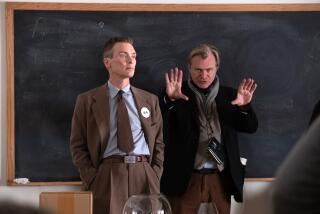SWEET 16 NOMINATIONS : Britain’s Channel 4 Is on a (Bank)roll
- Share via
LONDON — For a man who can claim he financed three movies that have won a total of 16 Oscar nominations this year, David Aukin has a modest office.
It is situated four floors above a narrow street parallel to bustling Tottenham Court Road in an unremarkable building. Inside, the five adults squeezed inside would induce claustrophobia.
The average studio head would sneer at such accommodation.
David Aukin, however, is not a studio head. He doesn’t even work for a studio.
He is head of drama for Britain’s Channel 4 television, the country’s fourth and newest terrestrial TV channel, which has just celebrated its first 10 years in existence. The channel’s brief is partly to provide alternative programming for non-mainstream audiences, which makes it more highbrow than BBC-1 and the commercial ITV, Britain’s mass audience channels.
One of Aukin’s duties is to commission filmmakers to create works for the channel’s “Film on Four” series, and to provide funding for other compatible films that can then be shown on “Film on Four” after a theatrical opening.
Aukin backed “The Crying Game,” the Neil Jordan film that grabbed a surprising six Oscar nominations and remains the most talked-about movie in America, with grosses in excess of $43 million. He said Channel 4 put up about one-third of the film’s budget, thought to be in the region of $5 million.
The channel also provided 25% of the financing for the Merchant Ivory film “Howards End,” which scooped up nine Oscar nominations, and contributed 10% to the budget of Louis Malle’s “Damage,” for which supporting actress Miranda Richardson received an Oscar nod.
“I’m very proud, because all three films were films the major studios would not have wanted to make,” Aukin said. “They’re examples of European films which have gone on to find a niche in the American market.”
Though “Howards End” won more Oscar nominations, Aukin feels most proprietary toward “The Crying Game”--mainly because Channel 4’s involvement was more substantial. As has been widely reported, producer Stephen Woolley supervised the shooting of the film under the imminent threat of bankruptcy being declared by the production company Palace.
Aukin recalled that Woolley and writer-director Jordan “fought very hard to persuade me to be involved. But I wanted Neil to improve the script.” He felt that after the extraordinary plot twist which has made “The Crying Game” such a talking point, the original script deteriorated. “I know once I agreed to put up some money, my ability to have the script improved would, by the nature of things, be diminished.
“But I think one of the triumphs of the movie is that the end is every bit as strong as the rest. I like to think it was better because of the pressure we applied. Of course,” Aukin said, breaking into hearty laughter, “I can see Neil and Steve might not see it that way.”
“Howards End,” Aukin agreed, was a different proposition--a film with known quantities in the form of star actors (Anthony Hopkins, Vanessa Redgrave) and hugely experienced producers in Ismail Merchant and James Ivory, who had already made successful adaptations of other novels by E.M. Forster.
“But none of these three films could have been made the way they were without Channel 4 being a part of the deal,” he noted. “In the case of ‘Damage,’ Louis Malle wanted to make a film on his own terms. He wanted control and specifically no involvement from a U.S. studio. He and his brother Vincent, who produced the film, wanted therefore to finance it principally out of Europe. So British Screen (a private company aided by government grants) and I gave a sizable chunk of the budget to give them the freedom to make ‘Damage’ the way they wanted.”
Aukin’s previous background was not in film, but stage. He had run theaters in Leicester and Hampstead, North London, before joining Britain’s National Theatre as executive director for four years.
He assumed his role at Channel 4 in 1990, succeeding David Rose, who had supervised “Film on Four” since the channel’s founding. In the 1980s, Channel 4 helped fund a number of films that achieved international success, including Stephen Frears’ “My Beautiful Laundrette” (which it wholly financed), Mike Newell’s “Dance With a Stranger” (which marked Miranda Richardson’s film debut) and the Merchant Ivory films “A Room With a View” and “Maurice.”
But the filmmaking climate in Britain has changed considerably since Channel 4 came into being, Aukin stressed. “More films were being made in Britain back then, and ‘Film on Four’ was an alternative to those films. Today, there’s almost nothing else being made to which we can be an alternative.
“That creates its own problems. Established filmmakers like Mike Leigh, Ken Loach, Derek Jarman and Peter Greenaway should be backed by the British film industry and shouldn’t need to come to Channel 4 any more to get their films made. But they still depend on us--and this means our room for maneuver in commissioning new filmmakers is restricted.”
Another problem for Channel 4 has been that only a handful of the films it has commissioned have recouped money. “I can’t get away with that any longer,” Aukin admits. Channel 4 needs to court audiences more actively; from the beginning of this year, it has had to raise revenue from its own commercials, instead of benefiting from an arrangement under which ITV ad revenue effectively subsidized it. “A significant number of our films have to be commercial now,” Aukin noted. “A channel that never had to consider audience ratings at all suddenly must.”
If it’s ratings he wants, this year’s crop of Oscar-nominated films will help. “I could have shown ‘The Crying Game’ cold on Channel 4 without it having been a theatrical movie, and I would have got a respectable audience--but with respect to Stephen Rea, Miranda Richardson and Forest Whitaker, they’re not mega-stars,” Aukin said. “I would now expect it to have a significant audience and to attract them for a number of (reruns).” As an example, “Film on Four” earlier this month showed John Boorman’s 1987 film “Hope and Glory,” which Channel 4 financed to the tune of just 6%, for the third time.
“The Crying Game” can expect a viewing audience of up to 5 million when it first airs on “Film on Four”--a high number by Channel 4 standards. “Not even successful movies are seen by that many people in theaters,” Aukin said.
Channel 4 is not the only British institution to discover the truth of this. The BBC has recently leaned toward making TV films that are also suitable for theatrical release; a film originally made for the BBC, Mike Newell’s “Enchanted April,” itself picked up three Oscar nominations this year. The BBC currently has a slate of eight films designed for theatrical release, including Frears’ “The Snapper,” and “Great Moments in Aviation,” directed by Beeban Kidron (“Used People”).
Aukin is flying to Los Angeles for the Oscar ceremonies, but cannot help speculating already about Channel 4 films that might figure in next year’s nominations. He describes as “extraordinary” the new film called “Naked” by Mike Leigh (“Life Is Sweet”). He has hopes for “Raining Stones,” directed by Ken Loach (“Riff-Raff”). He is intrigued by the possibilities of Newell’s next movie, called “Four Weddings and a Funeral.” And he enthused about the performances in “The Secret Rapture,” a film from a David Hare script starring Juliet Stevenson and Joanne Whalley-Kilmer.
But Channel 4 is also sticking to its mission to commission new filmmakers: Aukin believes names like Paul Anderson (“Shopping”) and David Attwood (“Wild West”) will soon become names to contend with. “This is what we’re about, backing new talent,” he said.
Aukin knows that Channel 4’s resources pose no threat to the major studios. “It’s no use us pretending to be a mini-Hollywood, nor should we try,” he said. “But it gives me great pleasure that Hollywood can see a different form of filmmaking and respond to it, as they did with these nominations. It shows a graciousness and generosity in that community.”
More to Read
Only good movies
Get the Indie Focus newsletter, Mark Olsen's weekly guide to the world of cinema.
You may occasionally receive promotional content from the Los Angeles Times.










